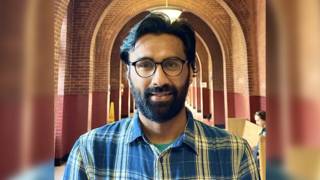
Guests
- Alexandria Goddardweb analyst who writes about national crime. She once lived in Steubenville, Ohio, and immediately took interest in the Steubenville rape case. She preserved crucial evidence in the case by taking screen shots of incriminating social media posts, photographs and videos, before they could be deleted. She posted them on her blog, Prinniefied.com.
- Marc RandazzaFirst Amendment lawyer who represented the blogger Alexandria Goddard. She was sued for defamation after documenting a rape case in Steubenville, Ohio, but the charges were later dropped.
Two high school football players in Steubenville, Ohio, have been found guilty of raping a 16-year-old girl at a party last August. On Sunday, the teenagers, Trent Mays and Ma’lik Richmond, were found delinquent in the sexual assault of the girl who witnesses testified was too drunk to move or speak. The case sparked a national controversy following the emergence of images and social media postings from the night of the assault. We’re joined by Alexandria Goddard, a crime blogger who first exposed crucial evidence in the case by taking screen shots of incriminating social media posts, photographs and videos, before they could be deleted. The hacker group Anonymous picked up on Goddard’s posts and released shocking video from the night of the assault. We also speak to Marc Randazza, a First Amendment lawyer who represented Goddard when she was unsuccessfully sued for defamation. “I’m convinced that if Ms. Goddard hadn’t started blogging about this and Anonymous hadn’t taken up the standard, that this case would have been swept under the rug,” Randazza says. [includes rush transcript]
Transcript
AMY GOODMAN: We begin our show in Steubenville, Ohio, where two high school football players have been found guilty of raping a 16-year-old girl at a party last August. On Sunday, the teenagers, Trent Mays and Ma’lik Richmond, were found delinquent in the sexual assault of the girl who witnesses testified was too drunk to move or speak. Mays, who was a high school quarterback, was also found delinquent on a second charge: taking and distributing a picture of the girl. Both young men had insisted that any sex that occurred between them and the girl was consensual. After the ruling, they broke down into tears, apologized to the victim, and were sent to a juvenile detention facility. They were also required to register as juvenile sex offenders.
Ohio state Attorney General Mike DeWine, a former U.S. senator, said he plans to convene a grand jury to determine if other crimes had been committed.
ATTORNEY GENERAL MIKE DEWINE: As I’ve indicated, we’ve been involved in an extensive investigation, trying to determine, trying to learn if any other individuals committed any crimes. While we have interviewed almost 60 individuals, 16 people refused to talk to our investigators. I have reached the conclusion that this investigation must—cannot be completed, this investigation simply cannot be completed, that we cannot bring finality to this matter without the convening of a grand jury.
AMY GOODMAN: Although the attack occurred in the summer, it only gained national attention after the cyber-activist group Anonymous obtained and published a shocking video from the night of the assault. The now-notorious 12-minute video shows a former classmate of the young men mocking the victim, laughingly referring to her as dead, and continuously joking about sexual assault.
STEUBENVILLE TEEN 1: Is it really rape? Because you don’t know if she wanted to or not. She might have wanted to. That might have been her final wish.
STEUBENVILLE TEEN 2: No, y’all think she’s dead?
STEUBENVILLE TEEN 1: She’s dead.
AMY GOODMAN: Along with the video, an Instagram photo also went viral. The now-infamous photo shows the two Steubenville high school football players holding their 16-year-old victim over a basement floor, one by her arms, one by her legs. State forensic analysts reportedly sifted through more than 396,000 text messages and 940 video clips recovered from cellphones as part of the investigation.
The Steubenville story has made national and international headlines, largely thanks to a local crime blogger. Before many of the partygoers could delete incriminating social media posts, the blogger, Alexandria Goddard, made copies and publicized them on her website, Prinniefied.com. She was sued for defamation, but the charges have since been dropped. Many Steubenville locals criticized Goddard for bringing negative public attention to the football team; others have praised her for holding sexual perpetrators accountable.
Well, for more, we’re joined right now by Alexandria Goddard. And in Las Vegas, Nevada, we’re joined by her First Amendment lawyer, Marc Randazza.
We welcome you both to Democracy Now! First, Alexandria, your reaction to Friday—to the verdict that came down yesterday?
ALEXANDRIA GODDARD: I’m glad that the victim had her day in court and that justice was served and, you know, hope that the grand jury that’s going to convene will hold others accountable who might be found accountable.
AMY GOODMAN: Let’s talk about that grand jury. Talk about Attorney General Mike DeWine and what he said yesterday.
ALEXANDRIA GODDARD: He stated that the investigation can’t be completed until they convene a grand jury to determine if other charges can be brought forward.
AMY GOODMAN: And why has this taken so long? Can you go back to August, Alexandria, and just give us a timeline? Explain what happened and when you came to know and make public what you knew.
ALEXANDRIA GODDARD: I came to know about it on August 22nd, the date that the two were arrested. The incident occurred on August 11th. And I believe in October, November, sometime, they had the probable cause hearing. And, I mean, it’s a juvenile matter. And the trial was yesterday. But I came to know of it on August 22nd.
AMY GOODMAN: And explain what actually took place. Go back to Steubenville, where you are from, and talk about what happened.
ALEXANDRIA GODDARD: There were various end-of-the-summer parties, and the victim was alleged to have been at three different locations, and the rape occurred at the last location. All of these kids were tweeting about the state of her sobriety and taking pictures, sending them back and forth. But that’s what happened. I mean, there were just several parties, and she was at various parties that evening with the two that were convicted yesterday.
AMY GOODMAN: I want to ask you about the role of cyber-activists in exposing what happened. In January, we spoke to, well, he called himself “X,” a member of the hacktivist group Anonymous, using a pseudonym.
“X”: I think it’s apparent to anybody who can stomach watching it for the entire 12 minutes. I, myself, here at our location—we’ve been working night and day on this operation, and I’ve watched it at least a dozen times, and it makes me sick each time we watch it. I think it speaks for itself.
AMY GOODMAN: He’s talking, of course, about this video. However, special prosecutor Marianne Hemmeter claimed the actions of the cyber-activist group Anonymous put more pressure on the rape victim.
MARIANNE HEMMETER: No matter how you cut this case, she was the center of the storm. And it wasn’t just Steubenville or Ohio; it became international. She’s a 16-year-old girl. She didn’t want to go forward on charges. She knew something bad had happened. But she was piecing it together like everybody else. And here is a girl who’s 16 who’s going to have to testify to the most intimate details of her life, some of which might be embarrassing. And to have not just a local stage, but an international stage, was unbelievably pressure-filled for her—and other witnesses. You know, we had pretty good working relationships with some of the witnesses that you heard from, but once Anonymous hit, there was a chilling effect.
AMY GOODMAN: That was special prosecutor Marianne Hemmeter standing next to Ohio’s attorney general, Mike DeWine. Alexandria, your response?
ALEXANDRIA GODDARD: You know, those—the kids put it on the Internet, and the Internet is an international audience. You know, I believe that Anonymous did bring attention to the case, and—you know, but it’s also empowered others to speak out and demand that justice be meted out.
AMY GOODMAN: On Sunday, CNN covered the news of the guilty verdict in the Steubenville case in a way that raised some eyebrows. Correspondent Poppy Harlow lamented that the “promising” lives of the rapists had been ruined.
POPPY HARLOW: Incredibly difficult, even for an outsider like me, to watch what happened, as these two young men, that had such promising futures—star football players, very good students—literally watched as they believed their life fell apart. One of—one of the young men, Ma’lik Richmond, when that sentence came down, he collapsed. He collapsed in the arms of his attorney, Walter Madison. He said to him, “My life is over. No one is going to want me now.” Very serious crime here, both found guilty of raping this 16-year-old girl at a series of parties back in August.
AMY GOODMAN: CNN correspondent Poppy Harlow. Alexandria Goddard, your response?
ALEXANDRIA GODDARD: My father told me when I was a child, if you do the crime, you do the time. We all know the difference between right and wrong and are responsible for our decisions. And, you know, when—again, if you break the law, you get punished for it. We all know that.
AMY GOODMAN: Can you talk about the role of the football team in Steubenville, where you come from, how important is it, and who these two young men were in the community?
ALEXANDRIA GODDARD: I don’t have knowledge of them personally in the community. I haven’t lived in the area for some years. The football team is very revered in the town. I mean, they’re very proud of their football team. But it’s—you know, it’s not just Steubenville that loves their football team. That whole Ohio Valley area, you know, their high school football is important to them.
AMY GOODMAN: And what happened around the larger issue of other people taking pictures, not intervening, but photographing, videoing, using their cellphones to—you know, to film what was taking place rather than stopping it, going to this issue of the attorney general, Mike DeWine, saying they’re going to convene a grand jury?
ALEXANDRIA GODDARD: Well, you have a number of children who were taking photographs, retweeting them. And rather than stand up and say, “Stop it,” they were passing around the information and, you know, humiliating and revictimizing this girl through the use of social media.
AMY GOODMAN: I want to talk to you about the lawsuit brought against you, Alexandria, which also brings in your lawyer, Marc Randazza, the lawsuit about you making public these images that you got on Facebook. Can you talk about what you found and how—why you were sued?
ALEXANDRIA GODDARD: There were no images from Facebook. Anything that was posted on my website was for public viewing. All Twitter accounts were open. Nothing was private. The lawsuit itself was not because pictures were posted. It was because anonymous commenters on my blog basically dared to have an opinion about some members—you know, some of the people who were involved in the events of that night. And so, the family of the ex-boyfriend sued me and 25 commenters for defamation of character.
AMY GOODMAN: And you were named in the suit, though it was later dropped. Marc Randazza, can you talk about this First Amendment issue?
MARC RANDAZZA: Yeah, the lawsuit was filed as a classic SLAPP suit. The point of it was to shut Alexandria up and to shut up the commenters. I think you’ve touched on the fact that this was a—the people involved in this enjoy a position of privilege in the community, and they are not used to having their misdeeds laid bare. And Alexandria really picked up the ball when the local mainstream media dropped it and stuffed the story, essentially. And in order to keep that story stuffed, that’s why I’m convinced that the lawsuit itself was filed, because it wasn’t just against her—and, frankly, against her for comments that she made—but they sued her as well for allowing comments by other people, which there’s very clear federal law that renders her immune for those—for liability for those comments.
AMY GOODMAN: Talk about who Cody Saltsman was—is, Marc Randazza.
MARC RANDAZZA: Well, he was the plaintiff in the case. But, you know, he is—he pretty wisely decided to drop the case, after we began to put up some kind of a fight, along with my local counsels, Mr. Nye and Mr. [Haren]. And the fact is that he actually seemed to have some level of contrition for bringing the case. So, you know, I don’t want to get too much into him, because he seems to have done the right thing.
AMY GOODMAN: And, Alexandria Goddard, your reaction to them dropping the case?
ALEXANDRIA GODDARD: Oh, you know, I was elated. No one wants to be sued. Lawsuits take up very precious time, and I would rather be out doing things I enjoy than battling a defamation suit.
AMY GOODMAN: And, Marc, the issue of other people now—it’s many months later, but the attorney general talking about convening a grand jury to go after others. Many years ago, there was the New Bedford rape case in a bar in New Bedford, Massachusetts, and the call of the community to not only go after the actual perpetrator, of the men—the people who had raped the woman in the bar, but all those who had been egging them on and who were there and didn’t try to stop it or call anyone to stop it.
MARC RANDAZZA: And so, what’s your question?
AMY GOODMAN: The question around the issue of a convening of a grand jury now, many months later, but talking about widening the targets of people who should be prosecuted.
MARC RANDAZZA: Well, look, that’s—you know, that’s not the case I’m involved in. I’m not the criminal lawyer here; I’m the First Amendment lawyer here. But I think that the grand jury being convened is a direct result of all of the sunlight put on this case. I’m convinced that if Ms. Goddard hadn’t started blogging about this and Anonymous hadn’t taken up the standard, that this case would have been swept under the rug. And I think that not only were—not only would perhaps justice not have been brought yesterday, but I think we also might have found that the limited amount of justice that was brought would have been brought only upon the heads of the two boys who were sentenced yesterday. If there is wider responsibility, well, then the investigation needs to continue. And I’m glad that it is.
AMY GOODMAN: In January, we spoke to Monika Johnson Hostler, president of the National Alliance to End Sexual Violence. She said the Steubenville case has forced America to take a hard look at its views on rape.
MONIKA JOHNSON HOSTLER: What we are calling for is not just how this is handled in Steubenville, Ohio, but really asking America to take a hard look at ourselves in how we are—handle sexual violence and rape in our country. I think we’ve been able to point our fingers and turn our heads to rapes that have happened in other countries and not held ourselves accountable as Americans to say that we absolutely still have a culture of rape, where women and girls are still degraded and dehumanized, and rape is in the fabric of this country. And unfortunately, I would think, centuries later, that we would be further along in terms of our response, but yet we still see Americans blaming victims. So, in terms of our overall response, we’re calling for America to take a hard look at itself and really think about the culture that we’re raising our kids in and the things that we are allowing to happen by not acknowledging, as a community, as a society, the importance of supporting the rape victim.
AMY GOODMAN: That was Monika Johnson Hostler, president of the National Alliance to End Sexual Violence. Alexandria Goddard, as we wrap up, your response to what she said? And also, given what you went through with the lawsuit, though it was dropped, the kind of chilling effect you think that has for future people like you to get involved in the way that you did as a blogger?
ALEXANDRIA GODDARD: I think everyone—you know, we have a responsibility to be involved in our community. And, you know, if you see what you perceive to be injustice, you shouldn’t sit by and do nothing about it. You should stand up and, you know, protect your right to free speech, but, you know—and what you believe in. That’s what our country is founded on.
AMY GOODMAN: And will you continue to follow this case, Alexandria?
ALEXANDRIA GODDARD: Yes, I will.
AMY GOODMAN: Alexandria Goddard, Steubenville-based blogger. Marc Randazza, lawyer who represented Alexandria when she was sued for defamation after documenting the rape case. That suit was ultimately dropped.
This is Democracy Now!, democracynow.org, The War and Peace Report. When we come back, it’s the 10th anniversary of the bombing of Iraq. We’ll be back in a minute.












Media Options